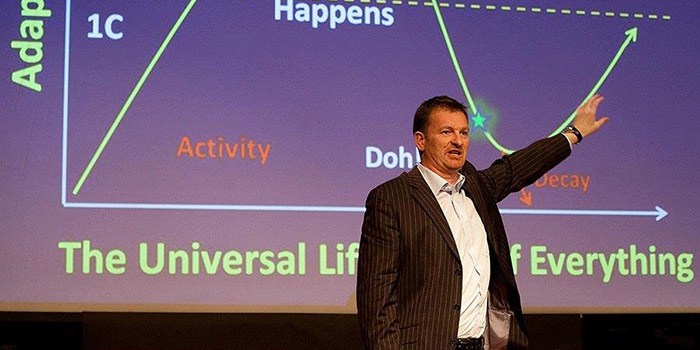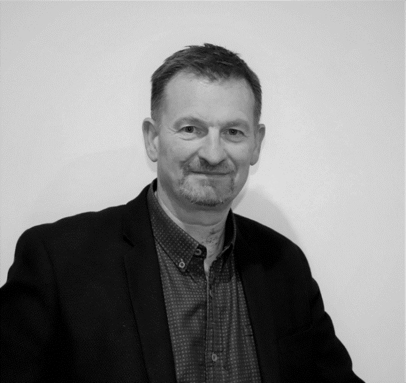The Art of Transformation: Part 2 – Leadership & transforming teams
Martin Murphy is founder of the Elite Leadership Global Academy. He teaches business owners and managers three powerful and fundamental principles of leadership and three core skills that will empower their people to become elite-teams which are agile, creative and enterprising. We spoke to Martin about his thoughts on business transformation.

What does transformation mean to you?
Ooh buzzword bingo!
I’ll answer this one by comparing the differences I believe there are between change and transformation.
There are some beliefs around change such as:
‘change is the only constant’ and ‘people are scared of change’.
That’s not strictly true. People change all the time but to stay in the same place. We change our TV channels, our clothes and our minds mostly to maintain a feeling. In fact, so afraid of experiencing uncertainty, that we remain comfortably uncomfortable in our comfort zones by making small changes to remain in a painful situation even when the evidence points to the fact that we need to make a shift.
When we entered the recession, this was due to Wall Street bending the rules in their favour, putting us all at risk. If ever there was a moment for transformation that was it. But bank bosses implemented some small changes to maintain their earnings which got them back to feeling wealthy, rather than transforming their modus operandi.
No people are not scared of change, what people are really scared of is transformation, especially if you’re winning in the present paradigm. But the ability to evolve and transform is essential for long term success. Ask Richard Branson.
Transformations are necessary when there is a paradigm shift and simple fixes will not solve the problems that have arisen. Without transformation, the same challenges repeat themselves and are usually more painful, longer lasting and more frequent. Lessons are repeated until they’re learnt.
Transformation maybe necessary when a business owner or organisation has followed the same strategy for a prolonged period of time and the context has evolved. The thing is, the context is always evolving. Life and business involve a series of paradigm shifts in which we shift from one world view to the next.
Business owners are scared of only two things:
- Not succeeding which motivates the entrepreneurial leader.
- Losing what they’ve gained which motivates the managerial leader.
The entrepreneur’s focus is on competing for business success. But to remain in that situation means the entrepreneur cannot take a day off as not everybody will be as competitive as them. To the entrepreneur, it feels like the business is their baby and nobody understands the business as well as they do. They begin to feel as though they have to make all the decisions. That’s because the team prefer it that way because it means they can’t get it wrong and into trouble. Everybody overworks and gets stressed.
So, when business owners have achieved a measure of success, they switch to maintaining control. Management skills take over to add certainty to the business by adding processes and technology. Management works well up to a point, but too much command and control and the business will begin to stagnate, becoming cumbersome and unresponsive.
Business leadership is about a series of evolutions from founder to entrepreneur, then to manager and sometimes coach and then the lifecycle starts again. The effective leader must learn to understand where they are on the lifecycle and respond appropriately.
In each of those stages there is a paradigm shift that involves a change not only in behaviours, but structure, beliefs and values too. The business owner must build trust in and within the team so that the leader can shift the balance of power to the team, if they’re to successfully transition through each business stage.
Often business owners achieve the management level and take on a siege mentality, defending their positions to stay stuck in time. As mentioned earlier, people don’t like uncertainty, denial is the default response, so ignore the warning signs. There are many examples of companies that were slow to transform such as Kodak, Blockbuster and Yahoo.
Successful transformations include Nokia, originally a rubber and tyre manufacturer before pivoting to where it is now, involved in space communications.
Long before Game Boy, Nintendo produced playing cards and IBM evolved from PC sales into becoming the top provider of enterprise server solutions.
At the macro level, business has been operating with an industrial revolution worldview. For around a hundred years managerial leaders have ruled the roost which hasn’t always been good for people or the environment. The 4th Industrial Revolution in which technology will replace a lot of bureaucratic jobs is a paradigm shift on the horizon which is fast approaching.
So, which do we use? Change or transformation?
Depends on the type of challenges you face.
Simple problems require simple behavioural changes.
Complicated but predictable problems are the realm of the technical manager where a check list will usually get to the bottom of the problem. When you have a solution, that solution will work every time in similar situations.
Another type of challenge is complex.
Homelessness is a complex challenge. If you fix one person’s situation, you’ll need to adapt the solution every time to fix everybody else because a ‘one fix-fix all’ approach won’t cut it. This needs a transformational solution; hence why bureaucratic governments cannot solve this and a lot of other challenges because the complex challenge needs a creative, adaptable and localised approach.
Describe your own involvement and expertise in the space of business transformation
I help business owners and leaders understand how their organisation can evolve exponentially from a people development perspective as opposed to an industrial revolution model which is linear and mechanical.
I help clients introduce the elite team concept based on my experiences of setting up self-managing teams worldwide who often had to operate in fast moving and volatile situations.
I recently wrote a book: ‘From Mercenaries to Missionaries ~ Designing, Developing & Leading High Performing Teams in Your Growing Business’ which describes the evolution that the entrepreneur undergoes to transform from being a mercenary entrepreneur into an inspirational leader on a mission to achieve something impactful and beneficial to society.
How and when should a transformation programme begin?
A transformation should occur when the there is a sense of disillusionment about the way things are going. When you notice symptoms such as high turnover of staff, smaller profit margins or an innovation which is transforming the landscape.
Another situation might be when you’ve been daydreaming as Einstein did and come to the realisation that the world could be a better place if you transformed your beliefs and behaviours and invented something new.
The first step is to get your team involved at the earliest and start talking.
As most people don’t enjoy uncertainty, it is imperative that you develop a narrative which includes why there is a need for transformation. Then create a compelling vision of the future in which they, the clients and society will benefit greatly. Then it is about co-creating and experimenting into that brighter future which involves developing a culture of trust and radical openness.
What are the risks of transforming a business model?
Not doing it is one.
The other is not getting alignment and buy-in at the beginning, from the people who’re helping you. Without buy-in, you will get resistance as the old system kick-starts it’s immune response.
People may self-select when you’re asking them to contribute more of themselves and leave the organisation. Often, you’ll be glad they did.
Describe a successful business transformation you’ve been involved with
I’m working with a client at the moment who have seen significant growth. As the team expanded, things were becoming confusing. Some of the people were merely trading time for money and turnover of staff was high. There was no buy-in and being a tech company, they needed to develop a focus on people as well as the technology.
I started by helping them implement the elite team concept making them more agile, creative and enterprising. They’re now able to build trusting relationships with clients and respond more effectively. A positive side-effect is that they began to care more about the clients now they’re directly involved with them and clarity of communication increased.
We spent some time training and practicing with tools which encourage deeper connection, collaboration and contributing more of themselves to the team’s results.
To do that I helped them develop a Mission Power™ Compass.
This is an opportunity for the whole team to create and understand the mission, why it matters, agree on their relationship values and determine key objectives. It also outlines broadly what some winning behaviours will be and, in this case, the new ‘people first’ strategy.
Share some examples of best practice during business transformation
Understanding the value of continuous ecology checks, as in checking in with stakeholders along the whole journey. People’s views will change as time goes on and it’s important for leaders to keep their fingers on the pulse and be responsive to people’s needs.
Leaders should also be celebrating results and milestones which help people feel that there is progression. Commitment and endurance from the leaders and team early on are essential. But the workload shouldn’t exceed the present workload by more than ten percent otherwise people will experience overwhelm. Try to build on familiar systems and processes as much as possible so that it feels like a natural evolution.
Realise that the first right answer is not always the best right answer. This forces the leader to take an emergent approach. Being open to and listening to feedback from the team and clients is essential.
What are the key attributes of a successful transformational leader?
I believe the most important attribute for any modern leader is that they must think very much like a traditional farmer. We don’t own the world, we don’t own our children, we don’t own the people that work with us.
Effective leaders understand they are merely the stewards of the organisation even if they created it. If they want the organisation to thrive, they must, like the farmer, create the optimal conditions and an ecosystem which enables people to thrive. Leadership is about leveraging the full potential of technology, people and resources.
They must be realistic idealists. That is, they believe in the vision of a better future but understand the difficulties involved in achieving it. They have to be courageous enough to take people on a journey but humble and open enough to listen to and accept feedback.
They and other influencers throughout the organisation must articulate the vision often. Inspirational leaders are excellent and prolific story-tellers and it has been shown by neuroscience that people respond positively to a well-crafted narrative.
They can be authentic but must also have a moral compass. Lastly, they must be the type of people who can activate others. They are able to leverage their personal power to inspire and motivate others to join them on a magnificent adventure.
Peter Drucker famously said that ‘culture eats strategy for breakfast’ What’s your view?
Well Drucker is famous for saying it but he didn’t actually say it. But never the less, it is an important insight.
An American entrepreneur by the name of Eli Halliwell, formerly a CEO of a cosmetics company and later an investment advisor, concluded in the mid-1990s that the single biggest factor in determining the success of a company was:
It always come down to the people. It’s about the whole team and the culture and it trumps strategy and financial position.
No matter what business you think you’re in, you’re in the people business first. We’ve been stuck in a phase of the universal life cycle which favoured command and control. People gave up their power because institutions offered a job for life, a pension and if they did as they were told they would be taken care of in later life.
That social contract has been ripped apart so people are looking for something more.
You can’t widgetize and programme people these days and expect it to work long term. Organisations who don’t understand this transformation, will also lose the war for talent as people move on to more meaningful work or just more money.
One of our biggest evolutionary advantages is our ability for connected collaboration. We didn’t compete our way to the top of the evolutionary tree, we collaborated our way there and that’s because we can create paradigms.
A culture, based on a paradigm – a worldview- enables people to think for themselves no matter where they are and able to make decisions which can influence the direction of the organisation. If people are bought into the brave new world paradigm, they can and will carry out the strategy.
About Martin Murphy
Martin Murphy is an author, speaker, advisor and facilitator on the subjects of leadership, elite teams, psychology and personal development. He has enjoyed a varied career and life which began with him running away from home to join the army. Martin initially served in the Far East which led to many opportunities for adventure, including exploring and climbing in the Himalayas, training in New Zealand, Fiji and learning how to thrive in the jungles of Brunei where he trained with the Special Air Service.

This experience convinced him to later become a member of the elite UK Special Forces. After he had learnt all he could he then went on to became an international trouble shooter in the airline industry. This role gave him plenty of experience of designing, developing and leading high-performance autonomous teams worldwide whose aim was to effectively combat terrorism and narcotic smuggling.
His diverse career has also seen him train members of the police, foreign intelligence officers and security teams who work in volatile and high-pressure environments. These days he focusses his skills on helping entrepreneurs, business owners and managers evolve into effective leaders and workgroups into elite teams.
Martin has packaged all this valuable and easily transferable knowledge into a recently published book; ‘From Mercenaries to Missionaries – Designing, Developing and Leading High Performing Teams in your Growing Business’. which has regularly attracted 5-star reviews on Amazon. Buy it here.

The book is a fusion of experience, deep reflection and personal research into elite teams, leadership and peak performance psychology.
Follow Martin on Twitter @EliteLdrCoach



